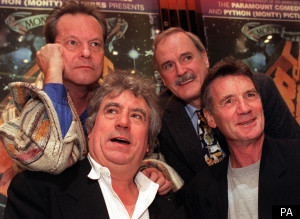Huffington Post
Ariston Anderson

Film director Terry Gilliam has one passion in life: to make movies that truly affect his audience, to enhance their dreams (or their nightmares), and to welcome them into an alternate reality. In his 40+ years of filmmaking, giving us classics like Monty Python and the Holy Grail, Brazil, The Adventures of Baron Munchausen, Twelve Monkeys, and The Imaginarium of Doctor Parnassus, few would argue that he has ever failed in this mission.

Gilliam recently made a return visit to Morocco, where he filmed Time Bandits30 years prior, to receive the highest honor bestowed at the Marrakech International Film Festival, a golden star. At the ceremony, his old friend Emir Kusturica described him grandly as the Franz Kafka of cinema.
Here, he opens up about the potential of modern satire, alternate realities, and just how important staying in the black is to creative success.
How do you feel about being called Kafka’s counterpart?
It’ll do. It’s nice. I remember somebody said when we were doing Brazil that it was like a cross between Franz Kafka and Frank Capra, which I thought was a great quote. That was perfect. The way Emir was describing it, it obviously had a really strong effect on him. And that to me is all it’s about. I want to make films that affect people strongly.
When you quit your job in the ’60s on a Chevrolet assembly line, you claimed you would never work a job for money again. What is it you work for today?
To keep myself from being bored [laughs]. I still just think there’s more films I want to make, and that’s all that it’s about. I like trying to keep making things to try and get people to react and think. There’s nothing specific. It’s just a general, being a gadfly I suppose.
With Python we sort of had enough money to live reasonably comfortably. I’ve always lived within my means. I’ve never been in debt in my life. I refuse to because I know the minute I’m in debt, I’m then at somebody else’s behest, and it’s the way Hollywood works. Hollywood is very good about getting everybody out there to live richly. So they’re all in debt. They’ve got mortgages, and they have to keep churning out whatever Hollywood wants them to make. And I can’t do that.

Your Trilogy of Imagination: Time Bandits, Brazil, and The Adventures of Baron Munchausen are meant to help us escape from our “awkwardly ordered society.” What does it mean to you to create these alternate universes?
For me they’ve always been a way of looking at the world we’re living in at that particular moment. And so by stepping out of it, you can end up back in it more clearly. And so most of my films are kind of removed from reality as we know it. But they’re all about the reality that we’re living in. If you go back to Life of Brian, it was a satire of things at that time, even though we dressed up in Biblical costumes and all that.
And it, I just think it’s, well, it’s the only way I actually know how to function, because I like being able to step back and not just recreate. I don’t ever want to try to recreate reality. I’ve always thought when I’m making a film, I like reassuring the audience this is artifice. It may be truthful. It might be closer to the truth than anything else, but it is artifice.
Would you ever make a satire about the world we’re living in today?
Well that’s the part… I don’t know how to get at it. I mean, how do you get at it? I think if there’s anything, it’s about how people are becoming so disconnected from reality even though we live in a time when everything is connected. And that’s the irony of it. And that’s why I’ve got this house in Italy. When I’m there, I just do manual labor. Just physical work, and dealing with trees, birds, bugs, rocks.
And then I start talking to younger people and I realize that they don’t understand where things come from. They don’t understand how the system works. This is terrifying. They just are consumers, and that’s it. And that’s like the dream if Orwell had written the dream. We don’t live in a socialist or capitalist society; it’s a consumerist society, and nobody cares, as long as they’ve got their goodies. And if it’s well-designed, it’s even better [points to an iPhone on the table].
And yet at the same time we’re supposed to be getting cleverer and thinking. What may be happening is, I just think people are becoming neurons, and they’re just part of this big thing. Hollywood was always like this. A new idea pops into the system “Boom!,” all these neurons start firing, synaptic gaps are being leapt. And then it dies down and the next idea comes. It goes like that. And the world is becoming like that now.
Read the full story at The 99 Percent and find out Gilliam’s favorite scene throughout his entire film career.
13113






